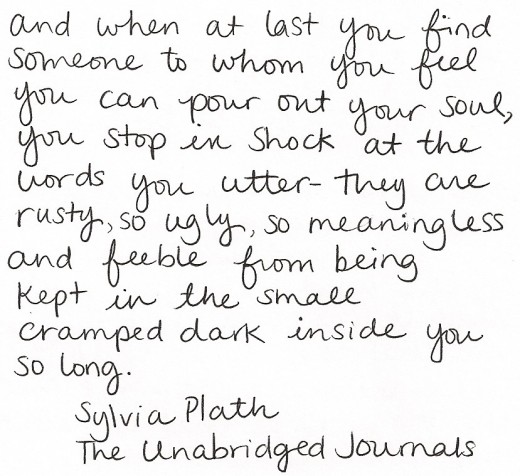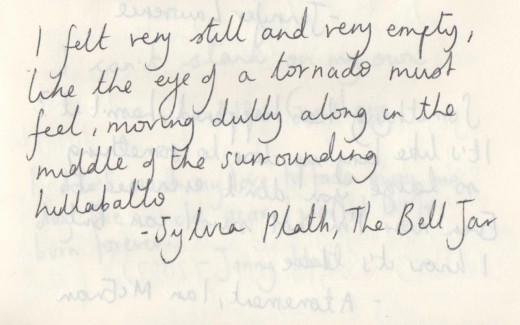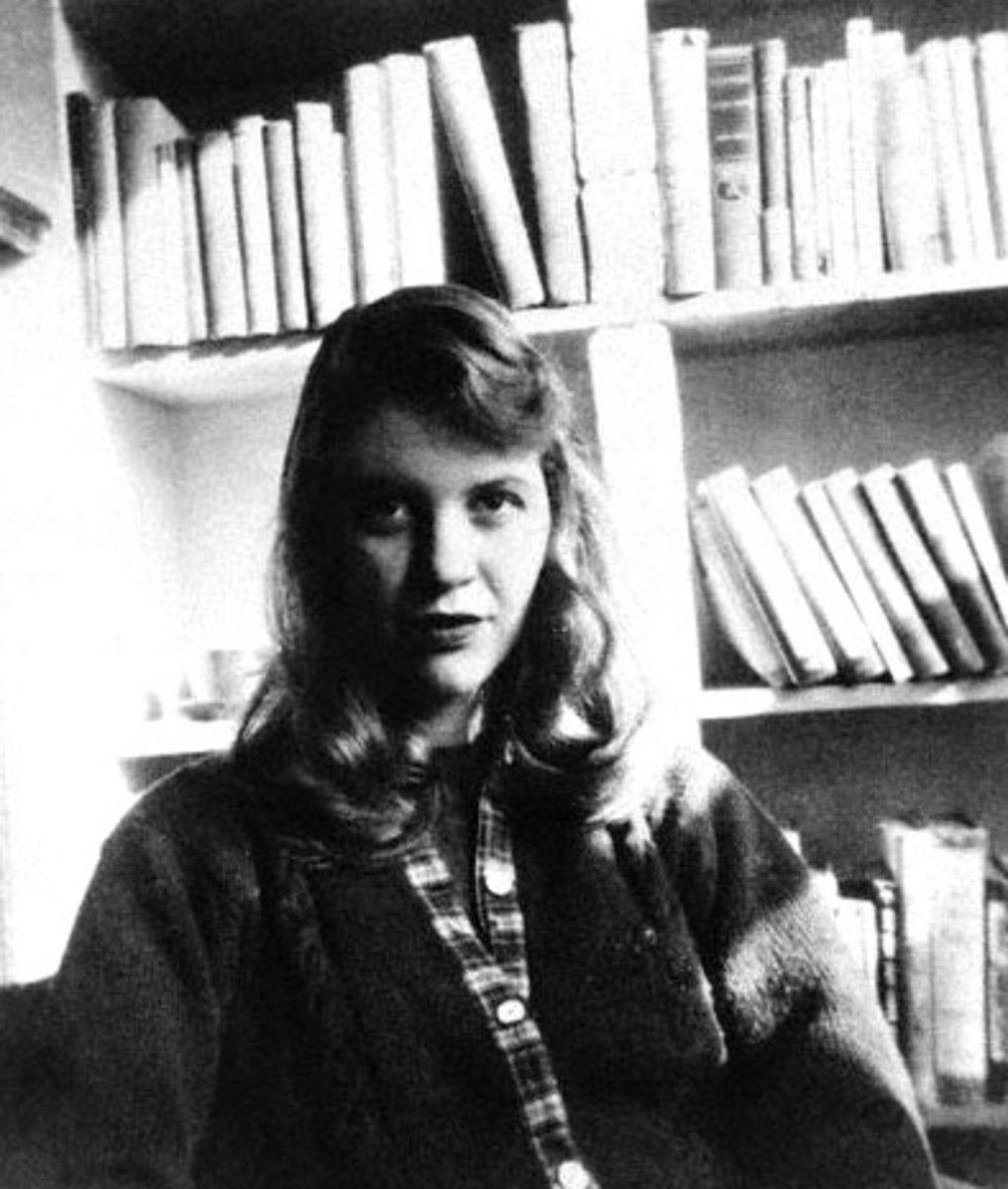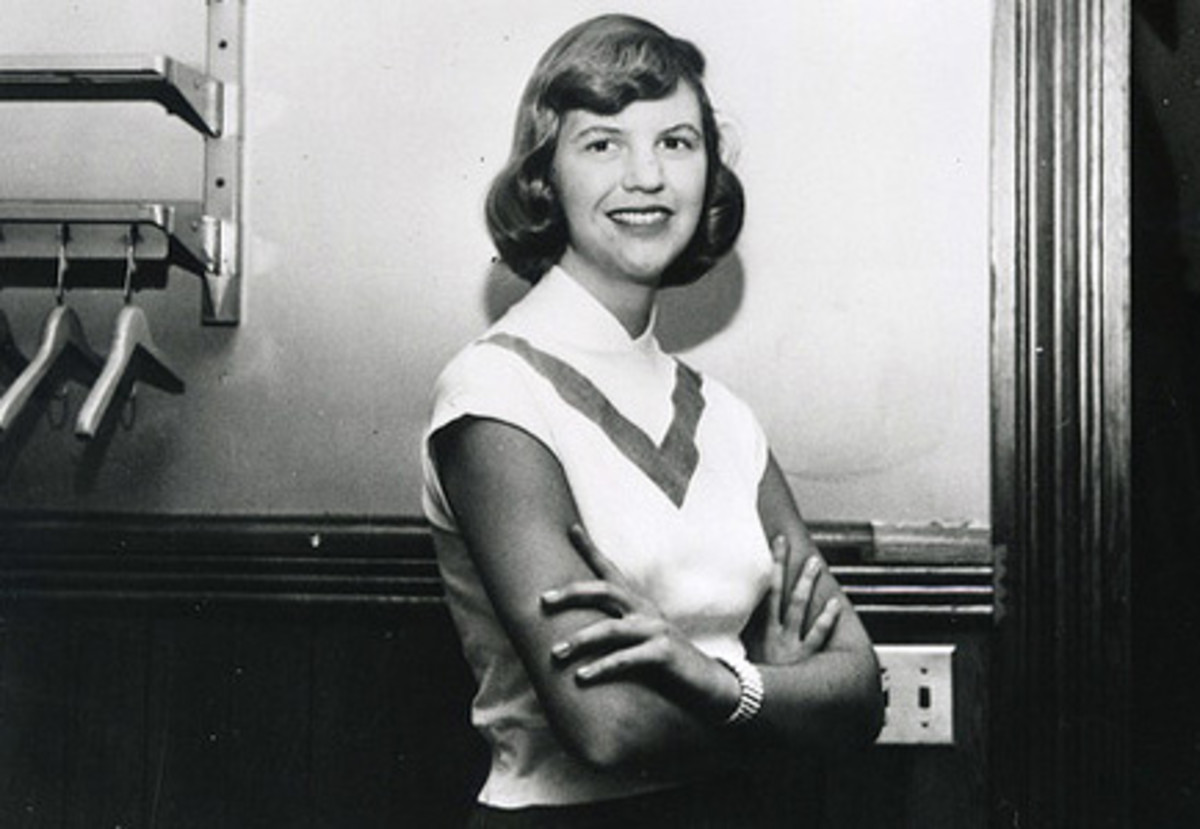Sylvia Plath: Unlocking Her Darkness
When first plunging into Bitter Fame I thought, what a perfect title to capture Plath's life. With her witty words and colorful attempts at suicide how can one not fall head over heels in love with the poet? Sylvia's continuous attempts at suicide can be seen as beautiful, in that she is a phoenix being reborn from a flame. The logic behind her constant obsession with her own demise was according to the book, "to kill her false self so that her real one might burn free of it", ergo the phoenix. When reading about the aftermath of her final attempt at suicide, many women saw her as empowering. In the preface I read that, "after her death and the publication of Ariel, many women discovered in her work a shocking revelation of extremist elements in their own psyches". It's as if Plath brings out every woman's deepest, darkest feelings towards themselves and the rest of the world as well. Every time I read her poems I become empowered and moved, as if she is speaking to me and helping to bring something out of my sub-conscious. Some descriptions of her power were as follows: "both heroine and author; when the curtain goes down, it is her own dead body there on the stage, sacrificed to her own plot"..."Spokeswoman for the angry, disillusioned, bewindered generations of the 1960s and 1970s"..."unanswerably dramatic gesture of female defiance"..."murderous art"...tragic heroine". The Freudian explanation of her power given by Sylvia is as follows, "Transferred murderous impulse from my mother, onto myself: the 'vampire' metaphor 'draining the ego'".
At 17 Sylvia noticed little signs of her uncomfortable longing. It was when she was at her mother's house in 1950; she wanted to go outside and get away from the stiff-stuffy house, but was unable to escape. The following is her description of that experience:
"I tried to open the front door. The lock snapped as I turned it; I tried the handle. The door wouldn't open...I glanced up, I saw a block of sky, pierced by the sharp black points of the pines across the street. And there was the moon...I felt suddenly breathless, stifled. I was trapped, with the tantalizing little square of night above me, and the warm, feminine atmosphere of the house enveloping me in its thick, feathery smothering embrace."
Stevenson pointed out that Plath looked to the sun and it's reflected counterpart, the moon, as mirrored images of one side and the other. You get a sense of this when she is glancing up at the moon. Stevenson also noted that Sylvia fought with the division of her two selves and I see that here. The image of mirroring reflections in pool of glass reminded me of Sylvia's poem "Mirrors". This poem isn't one that is discussed in the book Bitter Fame, but I felt it was appropriate in illustrating some odd things about Sylvia.

The poem "Mirrors" is one that illustrates the idea of two sides to one person. The person you see reflected in different pools and in certain lights is the person you want to be, but a mirror will reflect only truths. Maybe seeing her true nature was what Sylvia was aiming for in her poetry. She wanted to reflect a part of herself that was hard to express outwardly, and I think many people do this with the creative part of themselves. Whether you are a poet, novelist, or artist you find some way to bring out inner truths that you are afraid to show publicly.
The biography does a great job of showing her darker parts and illustrating what some don't want to understand her suicide attempts. In her first attempt she cut gashes into her legs and said, "I wanted to see if I could do it", but then began to crumble and proceeded to ask her mother to join her in death. This didn't sit well with me because the people I know who have violently attacked themselves never asked for an audience or for someone to join them. Then in a letter to Eddie Cohen, which was never sent, Plath explains her plans and reasoning for her much needed end:
"Pretty soon, the only doubt in my mind was the precise time and method of committing suicide. The only alternative I could see was an eternity of hell for the rest of my life in a mental hospital, and I was going to make use of my last ounce of free choice to choose a quick clean ending. I figured that in the long run it would be more merciful and inexpensive to my family; instead of an indefinite and expensive incarceration of a favorite daughter in the cell of a State San, instead of the misery and disillusion of sixty odd years of mental vacuum, of physical squalor, I would spare them all by ending everything at the height of my so-called career while there were still illusions left among my profs, still poems to be published in Harper's, still a memory at least that would be worthwhile."
Another thing I found interesting was Sexton and Plath's conversation on their suicide attempts and how they see themselves as "drawn to it like moths to an electric light bulb. Sucking on it!...It was life for us, lasting in spite of us". It's as if they are proud about their suicide attempts, and if this was something they discussed regularly then maybe they did so in order to perfect their craft. While reading through the book I noticed a question, "Did Sylvia Plath really mean to kill herself?" This made my wheels spin. All of her other attempts she was brought back or reborn, so I wonder did she think the same thing was going to happen here? I think not, in Dr. Horcher's view her suicide was too planned out and was said to be 100% intentional.
Quote from The Bell Jar

Now on to Ariel. When reading parts of the biography that referred to Ariel I only found a few things to be interesting. For instance, the multiple meanings the word Ariel embodies. One refers to the ethereal spirit of Shakespeare's Tempest and it was also the name of a horse Sylvia had. Ariel is said to be the spirit of poetry and has a spiritual connotation in Jewish mythology (the sacred flame of Leviticus and Isaiah). Another interesting note was the comments on her revisions. Plath crossed out the title page, changed the order of poems, and she never typed a final draft. Instead she just made copies of what she wrote and stuck them within the manuscript.
With the publication by Hughes, he made the executive decision of arranging her collection to display her range and to make nice with the public, so that her work was more acceptable to readers. I own both books of Ariel and the way Hughes did it was all wrong and took something away from the deceased Sylvia. I believe she intended her poetry to be published in an unfinished form that way it seemed more real, and so she could leave her thought process behind for future generations. He ruined the spirit of Ariel by conforming it to what people would read instead of doing it the way she had the manuscript laid out.
One poem that is discussed in Bitter Fame that I found to be very interesting was "Edge". This poem has a great feel of women empowerment and also has a haunting quality to it that I find beautiful.
Edge
"The woman is perfected. / Her dead // Body wears the smile of accomplishment, / The illusion of a Greek necessity // Flows in the scrolls of her toga, / Her bare // Feet seem to be saying: / We have come so far, it is over. // Each dead child coiled, a white serpent, / One at each little // Pitcher of milk, now empty. / She folded // Them back into her body as petals / Of a rose close when the garden // Stiffens and odors bleed / From the sweet, deep throats of the night flower. // The moon has nothing to be sad about, / Staring from her hood of bone. // She is used to this sort of thing. / Her blacks crackle and drag."
Review of Bitter Fame
- - New York Times
LEAD: BITTER FAME A Life of Sylvia Plath. By Anne Stevenson. With additional material by Lucas Myers, Dido Merwin and Richard Murphy. Illustrated. 413 pp. Boston: A Peter Davison Book/Houghton Mifflin Company. $19.95.






